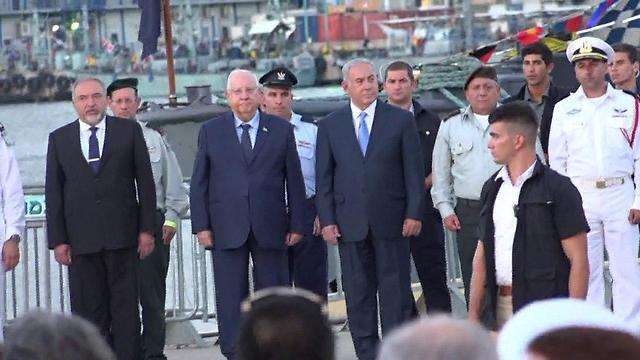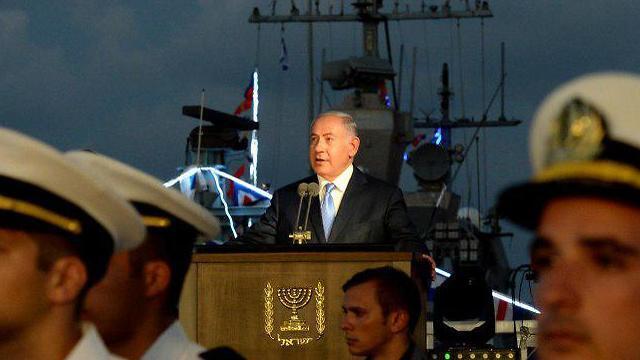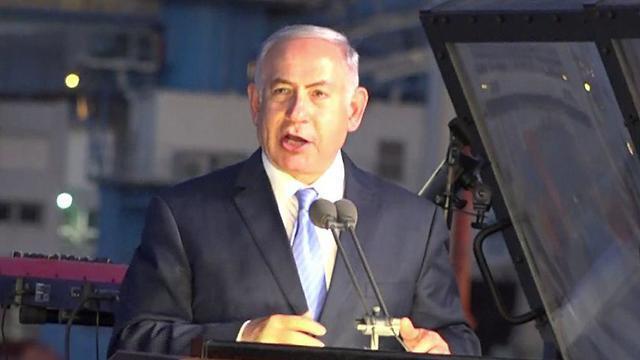Getting your Trinity Audio player ready...
Prime Minister Benjamin Netanyahu warned Iran Wednesday against any attempts to block a critical sea channel for cargo ships and oil tankers, following threats from the Islamic republic to close the lane amid looming US economic sanctions.
Speaking at the Haifa navy base hosting a navy officers' course graduation ceremony, Netanyahu warned that an international coalition, which would include Israel, would be formed and determined to prevent Iran from disrupting international shipping by closing the Bab el-Mandeb strait.
Last week, Saudi Arabia said it was suspending oil shipments through the strait that links the Red Sea to the Gulf of Aden on the main sea route from the Middle East to Europe, after Yemen's Iran-aligned Houthis attacked two ships in the waterway.
Saudi Arabia and Iran are in a three-year-old proxy war in Yemen, which lies on the southern side of Bab al-Mandeb.
Yemen's Houthis, who have previously threatened to block the strait, said last week they had the naval capability to hit Saudi ports and other Red Sea targets.
Iran has not threatened to block Bab al-Mandeb but has said it would block the Strait of Hormuz, at the mouth of the Gulf, if it were prevented from exporting its own oil.
“At the start of the week we witnessed a sharp clash with Iranian proxies who tried to obstruct international navigation in the straits at the entrance to the Red Sea,” Netanyahu said.
“If Iran tries to block the Bab-el-Mandeb, I am convinced that it will find itself facing a determined international coalition to prevent this. This coalition would also include the State of Israel and all its arms," he warned.
"The sea provides us with many opportunities. Above all it increases the small size of the State of Israel and allows us to deploy our vessels above and below the waves across a vast area. This gives the State of Israel considerable power,” he continued.
"The sea increases the small area of the State of Israel and allows us to spread our vessels over water and under water, in vast space, and this gives the State of Israel tremendous power,” he told the graduates.
A significant portion of Israel’s campaign against threats and terror—both in the north and south—the prime minister added, was taking place in the sea. “The expansion of the tasks assigned to the navy is a large part of the secret,” Netanyahu declared, praising the fact that Israel’s naval maritime capabilities had significantly improved in the 70 years since the country gained independence.
“It started off small and modest and blossomed into a long and deadly arm,” he said. “Our enemies are also developing capabilities, but we have a clear goal to promote them, to destroy threats, and if needed, to decide on a campaign if it is forced on us.”
Netanyahu celebrated what he said was Israel’s huge investment in the navy, in submarines, in vessels, in the best weaponry and state of the art technology.
Defense Minister Avigdor Lieberman also addressed threats posed by the closure of vital sea lanes.
3 View gallery


L-R: Minister Lieberman, President Rivlin, PM Netanyahu and Chief of Staff Gadi Eisenkot
(צילום: אביהו שפירא)
“Recently we have heard threats to hit Israeli ships in the Red Sea. I look at the people around me here and it’s a shame that our enemies cannot see you too in order to understand that we are totally ready to provide a response both in the Red Sea, in the north and the south,” Lieberman said at the ceremony which was also attended by President Reuven Rivlin and IDF Chief of Staff Gadi Eisenkot.
“I want to emphasize, the IDF is prepared and ready to given a response on two fronts simultaneously. Only on this matter will we be less picky and the blow to our enemies will be even stronger,” he said. I hope that they take that into account.”
Ships bound for Israel, mainly from Asia, pass through the waterway to Eilat, or continue through the Suez Canal to the Mediterranean Sea. Ships bound for Jordan's Aqaba port and for some Saudi destinations must also pass through the strait.
Bab al-Mandeb is 29 km (18 miles) wide, making hundreds of ships potentially an easy target. The US Energy Information Administration said an estimated 4.8 million barrels per day of crude oil and products flowed through it in 2016.



